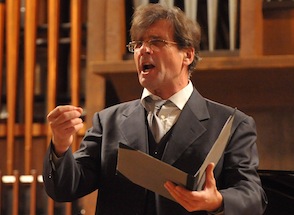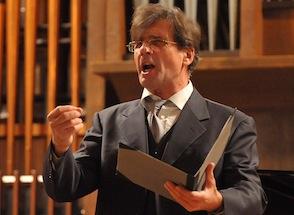
The pinnacle of all song cycles, Schubert’s Die Winterreise (The winter journey), beckons baritone Wolfgang Holzmair back to Cal Performance’s Hertz Hall on March 4. The Austrian-born master recitalist, whose long history of performing includes receiving first prize in the Musikverein International Lieder Competition in 1982 and recording a host of lieder recitals with his longtime collaborator, pianist Imogen Cooper, has spent the last 14 years alternating performances in recital and opera with teaching lieder interpretation at the Salzburg Mozarteum and giving master classes around the globe.
Reached by Skype in Belgium, where he was in the midst of giving a master class to nine students at the Brussels Conservatoire, Holzmair was extremely forthcoming as he discussed art song interpretation and his approach to Winterreise.
Featured Video
I recently interviewed a woman in her 30s who is making a fine career in Europe, singing early music with René Jacobs and other conductors. She claimed that if you’re good at opera, then you’ll be good at lieder. But you and I know that isn’t true. A lot of fine opera singers don’t make a successful transition between the two.
On one side, that is correct. They are not used to interpreting art song. You have to train when you’re a student or in the early years of your career. But I agree with this woman because, in general, you use the same voice. With lieder, you [usually] don’t sing with an orchestra, and you sing in smaller halls. But for both, you have to have a technique, a comic side, and personality, and you have to be a good storyteller. There aren’t the great differences that some people would suggest.
I can think of several current singers who hold back emotionally in song. Their sound may be beautiful, but they don’t engage me emotionally.
I understand this, because many opera singers have problems when they don’t have a costume, colleagues, and a conductor, and are just on their own. That’s very different. Also, in recital, you may be able to see the audience, which you can’t see in the opera house.
It is very difficult to tell a whole story in one short poem, and then accomplish that in maybe 20 or 25 times in one evening. Every minute, you have to change into a different story, and that is extremely demanding. Opera singers who are accustomed to performing a single character in an evening may have a lot of trouble with this. To step from one emotion to a completely different one requires a lot of training.
I can’t sing a recital with 29 songs, some only a minute in length, and take time to adjust between each song. If you take too much time, then the song is over [chuckling].
This leads to Die Winterreise, which some consider the summit of lieder interpretation. As their feelings, voices, and approaches changed, Dietrich Fischer-Dieskau recorded it nine times, and Hans Hotter four. How has your interpretation changed since you made your recording of Winterreise for Philips [available on demand from arkivmusic.com] 16½ years ago?
Not extremely, but it has certainly changed. The singer matures, the voice is certainly a little bit different, and I have more insight into the whole thing. When I made the recording, I had done 20 or 25 performances. Now I’ve done 40 or 45 or 50 — I don’t know, because I haven’t counted.
The main message of the song recital hasn’t changed that much, but the end has changed. I’m now seeing the journey [as being] less bitter. “Der Leiermann” (The organ grinder) in the last song can even be somebody who brings a kind of consolation.
You have to understand: My approach could change completely in the next three performances, because I’m not really going into the concert with a firm, fixed, and well-cooked concept. I allow myself to be free and spontaneous.
That must be extremely difficult for a lot of your students.
But this is exactly what I think my work should be: to give the students the feeling they can go to the limits of emotion, or allow themselves to try things. Just today, what I said to the students is that what people really don’t like is when you don’t risk. If you don’t risk, you’re on the safe side, and if you’re on the safe side, you are boring.
Performing art involves risk. All artists have to give, every day. If they don’t allow themselves to go to the limit, and sometimes step over their limits, then the performance won’t interest us.
This is what I felt at a recent recital I reviewed.
Yes, because the singer thought technically. The voice was technically perfect in its delivery. I don’t like “voice deliverance”; I like storytellers!
Have you changed in this aspect?
My target was always, “Give what you have, and don’t keep back.” The difficult thing still is, you have to give everything, you have to risk a lot, and still you have to control [chuckles] and work at the same time. If you cry on the stage, people laugh. That’s not what you want.
If you don’t risk, you’re on the safe side, and if you’re on the safe side, you are boring.
This is so difficult. You have to step into the song with the greatest emotions you can possibly convey, and still control at least a little bit what you do. If you don’t control technically, you are taken away by the emotions, and that’s not good.
It was either the baritone Johann Michael Vogl or another member of Schubert’s inner circle who reported how disturbed everyone was when Schubert first presented Winterreise to them. The first time I heard the final song, “Der Leiermann,” in a peerless recording by Lotte Lehmann, I was left shivering. How do you perceive this cycle of grief and loss? What is happening to this person, and where does he end up?
In my view, there is no real story, because the story has already happened. He didn’t find the love he wanted to find. Then he went to 24 stations, like on a Calvary Mountain. At times there is the thought of finding hope, but it is immediately recognized as either deception or fake. He goes through grief, he goes through deception, and he goes through hope for lost love.
When I sang “Der Leiermann” in the late ’90s, it was the symbol of emptiness; everything repeats, but maybe in a bad way. But now I feel that the organ grinder may be the only person who gives him a little relief or consolation at the end. He talks about animals — “die Hunde” (the hounds) in No. 17 (“Im Dorfe” / In the village), and early on in No. 11 (“Frühlingstraum” / Dream of spring). This is very depressing, because what gives him hope is not people; it’s nature.
Schubert is the summit; he is the alpha and omega of liedgesang [song singing].
The climax of the whole cycle for me is No. 21, “Das Wirtshaus” (The inn), which means “cemetery” in this context. Not even in the cemetery does he find a place for himself. That’s horrible.
How do you feel at the end of a performance of Winterreise?
I’m completely exhausted. I have no desire to speak immediately to anyone. It’s not because I’m not polite; I have to come down, and with Winterreise it takes a little bit longer. It’s 75 minutes without a break. And it’s even longer, because before you start performing, you have to do a lot of preparation to be in the right mood.
Die Winterreise doesn’t start nice or pleasant, as does Die schöne Müllerin. With the first verse — “I came as a stranger, and I will leave as a stranger” — you paint the big canvas. To be able to start like this, you have to concentrate for at least 30 minutes, if not hours. Then you sing 70 or 75 minutes, and give everything you possibly can give. If I’m not exhausted, then I did not try to tell the story; I did not give enough.
There are different ways to sing these two cycles. You can sing them like a report, or you can be the person in the story. You can sing about the miller, or you can be the miller.
How do you tell someone who doesn’t know the cycle that their life would be richer for spending 75 or 80 minutes listening to one song of grief after the other?
I don’t think Winterreise deals with issues of the early 19th century; they are the big issues for our time. The cycle is contemporary, despite the age of the music of Franz Schubert and the poetry of Wilhelm Müller. Lost love, and all this — how people have to go through such hell of deception and failure — is quite common. I think people nowadays are more alone than they were 30 or 40 years ago.
Despite the horrible feelings and emotions, the music is wonderful! And Schubert is the summit; he is the alpha and omega of liedgesang [song singing]. His music is simply great. The poems are old-fashioned, but they deliver a message that is contemporary.

